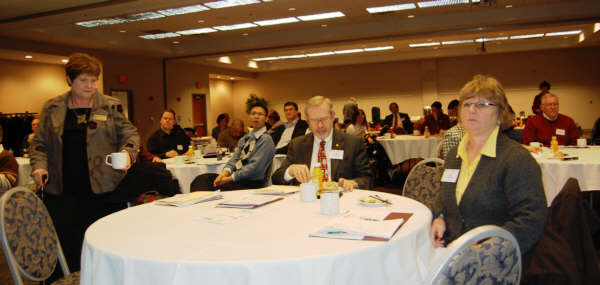
Former Lansing mayor David Hollister, center, is among about 100 attendees at a Saginaw Valley State University workshop on bioeconomy innovation last Thursday in Curtiss Hall. China Becoming 'Better World Citizen' Says Dow Global Business Director
|
||||||||||
| Printer Friendly Story View |
(EDITOR'S NOTE: This is the first in a series of columns and articles about Michigan's emerging bioeconomy from a recent workshop at Saginaw Valley State University, part of a series of alternative energy diversification conclaves.)
The United States is struggling to regain its manufacturing job base that has largely fled to China.
The Great Lakes Bay Region, with leadership from Bay, Midland and Saginaw chambers of commerce, Saginaw Valley State University and the Michigan Economic Development Corporation (MEDC), is looking to a whole new field to create jobs -- bioeconomy.
"Bio-based materials and processes represent a significant market opportunity for durable goods industries in the Great Lakes Bay Region seeking to substitute energy-intensive and environmentally unfriendly materials with cost-effective and sustainable alternatives," says Mark Clevy, director of entrepreneurship & commercialization and alternative energy cluster at SVSU.
SVSU sponsored a workshop on bioeconomy last week that presented a whole new array of opportunities. The workshop was attended by about 100 entrepreneurs, business developers, innovators and students.
The threat of piracy of U.S. innovations and jobs by China, however, looms over efforts to find and sustain any new economic base, in our opinion.
"China is becoming a better world citizen," said Steve Tuttle, global business director for biosciences ventures and business for The Dow Chemical Company. He says Dow has been successful in protecting its intellectual property in China.
Dr. Christopher Schilling, Charles J. Strosacker chair of engineering at SVSU, agreed with the premise that the Chinese threat to U.S. innovation is real and ongoing.
According to Tuttle, "woody biomass" is Michigan's edge. The preponderance of wooded areas throughout the state is being eyed as a renewable economic resource.
In fact, information presented at the bioeconomy workshop on Jan. 14 indicated that Michigan's land covered by forests has increased by 30 percent in recent years. Forested areas in many other states, by contrast, has been decreasing.
A vast array of new business opportunities is being projected for local entrepreneurs by the workshop presenters. Bio-based products hold the potential to replace petroleum-based products, thus contributing to U.S. energy independence.
One product area described by Tim Colonnese, of KTM Industries, Lansing, is "Green Cell" biodegradable engineered foam for cushioning and insulation applications. The material is similar to petroleum-based foams used in packaging but is made from cornstarch.
"Green Cell foam is the product of choice for discerning companies to protect their products during shipping while demonstrating environmental stewardship," said Colonnese. "The family of Green Cell products provides a true ecological alternative to synthetic foams such as polyethylene and polystyrene without sacrificing performance."
KTM is finding a growing market for Green Cell thermal shipping coolers, that are replacing poly coolers.
An author says Intellectual Property Rights (IPR) infringement is so rampant in China that counterfeit goods - from general household merchandise, garments and media consumables to specialist products including pharmaceutical products and super computer chips - can be found in roadside stalls, markets, shops, department stores and even laboratory of leading universities.
If allowed to continue these infringements may further engender a socially accepted culture of "fakeness" that may seriously hamper innovation and economic progress, writes Gordon C. K. Cheung.
Cheung uses the case of intellectual property rights (IPR) to examine how and to what extent market forces and knowledge development affect the relationships of China and the world, especially the United States.
Without controls on IPR, as fast as the United States creates innovations like Green Cell Foam, they will disappear into the Chinese economic machine and provide jobs overseas instead of here.
Along with innovation, U.S. policymakers need to deal strictly with the Chinese. Without accompanying diplomacy related to IPR protection, the chances of restoring our job base diminishes greatly. ###
| Printer Friendly Story View |
|
|

Dave Rogers |
|
|
|
Printer-Friendly Story View
0200 Nd: 04-16-2024 d 4 cpr 0
12/31/2020 P3v3-0200-Ad.cfm
SPONSORED LINKS
12/31/2020 drop ads P3v3-0200-Ad.cfm


